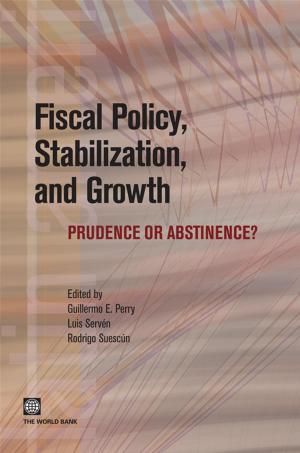Trade Preference Erosion: Measurement And Policy Response
Nonfiction, Social & Cultural Studies, Political Science, International, International Relations| Author: | Hoekman Bernard; Martin Will; Braga Carlos Alberto | ISBN: | 9780821377079 |
| Publisher: | World Bank | Publication: | April 15, 2009 |
| Imprint: | Language: | English |
| Author: | Hoekman Bernard; Martin Will; Braga Carlos Alberto |
| ISBN: | 9780821377079 |
| Publisher: | World Bank |
| Publication: | April 15, 2009 |
| Imprint: | |
| Language: | English |
Unilateral preferences granted by OECD countries introduced an inevitable tension between "more preferred" developing countries -- typically beneficiaries from pre-existing colonial regimes -- and other developing countries with respect to the effects of most-favored-nation liberalization by preference-granting countries. Concerns about preference erosion became an important point of debate in the the WTO Doha Development Agenda negotiations. Since the late 1990s, major OECD countries have significantly increased the scope and coverage of unilateral preferential regimes for the least developed countries; hence, it is not surprising that preference erosion has become an issue of concern. This volume reviews the current value of preference programs of major OECD countries for beneficiary countries, assesses the implications of preference erosion under different global liberalization scenarios, and discusses potential policy responses. Contributions to the volume provide detailed analyses of specific preference programs and undertake cross-country, disaggregated analyses of the impact of preferences at the product level. Understanding the likely impacts and how those impacts are distributed is a precondition for formulating appropriate policy responses to preference erosion. A case is made that such responses need to focus on enhancing the competitiveness and supply side capacity of developing countries.
Unilateral preferences granted by OECD countries introduced an inevitable tension between "more preferred" developing countries -- typically beneficiaries from pre-existing colonial regimes -- and other developing countries with respect to the effects of most-favored-nation liberalization by preference-granting countries. Concerns about preference erosion became an important point of debate in the the WTO Doha Development Agenda negotiations. Since the late 1990s, major OECD countries have significantly increased the scope and coverage of unilateral preferential regimes for the least developed countries; hence, it is not surprising that preference erosion has become an issue of concern. This volume reviews the current value of preference programs of major OECD countries for beneficiary countries, assesses the implications of preference erosion under different global liberalization scenarios, and discusses potential policy responses. Contributions to the volume provide detailed analyses of specific preference programs and undertake cross-country, disaggregated analyses of the impact of preferences at the product level. Understanding the likely impacts and how those impacts are distributed is a precondition for formulating appropriate policy responses to preference erosion. A case is made that such responses need to focus on enhancing the competitiveness and supply side capacity of developing countries.















